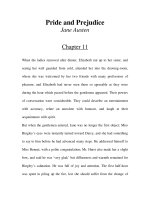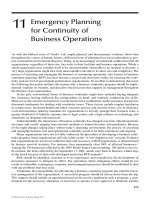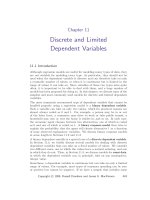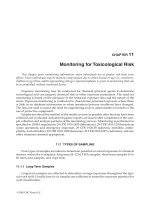International interviewing and counseling 9th ivey chapter 11
Bạn đang xem bản rút gọn của tài liệu. Xem và tải ngay bản đầy đủ của tài liệu tại đây (318.33 KB, 24 trang )
Intentional Interviewing and Counseling:
Facilitating Client Development in a
Multicultural Society
9th Edition
Allen E. Ivey
Mary Bradford Ivey
Carlos P. Zalaquett
Copyright © 2018 Cengage Learning. All Rights Reserved.
Chapter 11
Reflection of Meaning
and Interpretation/Reframe:
Helping Clients Restory Their Lives
Copyright © 2018 Cengage Learning. All Rights Reserved.
Chapter Goals and Competency Objectives (slide 1 of 2)
Awareness and Knowledge
▲ Understand the skills of reflection of meaning and interpretation/reframing.
▲ Recognize their similarities and differences.
▲ Explore the rationale and some philosophical background of the centrality of these two skills.
▲ Become aware of the critical work of Viktor Frankl, philosopher and practical psychiatrist, who
developed logotherapy to change the direction of clients’ lives.
▲ Explore discernment, a practical system to aid clients in deciding life direction.
Copyright © 2018 Cengage Learning. All Rights Reserved.
Chapter Goals and Competency Objectives (slide 2 of 2)
Skills and Action
▲ Assist clients, through reflection of meaning, to explore their deeper meanings and values
and to discern their goals and life purpose or mission.
▲ Help clients, through interpretation/reframing, to find alternative ways of thinking that
facilitate personal development.
▲ Evaluate clients’ progress and change as you use these skills.
▲ Employ the action philosophy and practice of logotherapy.
Copyright © 2018 Cengage Learning. All Rights Reserved.
Introduction: The Skills of Reflecting Meaning and Interpretation/Reframing (slide 1 of 2)
Reflection of Meaning: Meanings are close to core
Anticipated Result: The client discusses stories, issues,
experiencing. Encourage clients to explore their own
and concerns in more depth with a special emphasis
meanings and values in more depth, from their own
on deeper meanings, values, and understandings.
perspective, and also the perspectives of others.
Clients may be enabled to discern their life goals and
Questions eliciting meaning are often a vital first step.
vision for the future.
A reflection of meaning looks very much like a
paraphrase, but focuses beyond what the client says.
Appearing often are the words meaning, values, vision,
and goals.
Copyright © 2018 Cengage Learning. All Rights Reserved.
Introduction: The Skills of Reflecting Meaning and Interpretation/Reframing (slide 2 of 2)
Interpretation/Reframing: Provide the client with a new
Anticipated Result: The client may find another
meaning or perspective, frame of reference, or way of
perspective or meaning of a story, issue, or problem.
thinking about issues. Interpretations/reframes may
The new perspective could have been generated by a
come from your observations; they may be based on
theory used by the interviewer, from linking ideas or
varying theoretical orientations to the helping field; or
information, or by simply looking at the situation
they may link critical ideas together.
afresh.
Copyright © 2018 Cengage Learning. All Rights Reserved.
Eliciting and Reflection of Meaning
▲The eliciting and reflection of meaning is both a skill and a strategy.
As a skill, elicit meaning:
“What does ____ mean to you, your past, or future life?”
As strategy, you bring out client stories from the past, in the present, or in
anticipation of the future.
Copyright © 2018 Cengage Learning. All Rights Reserved.
Reflection of Meaning and Charlis
Charlis, a workaholic 45-year-old middle manager, has a heart attack. After several days of intensive
care, she is moved to the floor where you, as the hospital social worker, work with the heart attack
aftercare team. Charlis is motivated; she is following physician directives and progressing as rapidly
as possible. She listens carefully to diet and exercise suggestions and seems the ideal patient with an
excellent prognosis. However, she wants to return to her high-pressure job and continue moving up
through the company; you observe some fear and puzzlement about what’s happened to her and
where she might want to go next.
Copyright © 2018 Cengage Learning. All Rights Reserved.
Reflection of Meaning
▲Eliciting meaning often precedes reflection.
▲The key words meaning, sense, deeper understanding, purpose, vision,
etc. will be explicitly or implicitly present.
▲Provides an opening for the client to explore issues in a way that leads to
a deeper awareness of the possibilities of life.
Copyright © 2018 Cengage Learning. All Rights Reserved.
Comparing Reflection of Meaning and Interpretation/Reframing
▲
Both are designed to help clients look deeper and examine themselves from a new perspective.
▲
Reflection of meaning involves client direction. The client provides the new perspective.
▲
Interpretation/reframe implies interviewer direction, and it offers a new way of being as suggested by the counselor.
▲
Both end up in the same place.
We need to give clients power and control of sessions whenever possible.
If the client does not respond to reflective strategies, move to active reframing or a theoretical interpretation.
Copyright © 2018 Cengage Learning. All Rights Reserved.
Eliciting Client Meaning
▲Questions that may orient toward meaning:
“When in your life did you have existential or meaning questions? How have you resolved these
issues thus far?”
“What significant life events have shaped your beliefs about life?”
“What are your earliest childhood memories as you first identified your ethnic/cultural background?
Your spirituality?”
“What are your earliest memories of church, synagogue, mosque, a higher power, or discovering your
parents’ vital life values?”
“Where are you now in your life journey? Your spiritual journey?”
Copyright © 2018 Cengage Learning. All Rights Reserved.
Reflecting Client Meanings
Reflect Meaning
▲ Say back to clients their exact key meaning and value words.
▲ Reflect their own unique meaning, not yours.
▲ Occasionally you may supply the needed meaning word yourself (e.g., “You value …”)
Keywords: meaning, value, reasons, intent, cause, etc.
Copyright © 2018 Cengage Learning. All Rights Reserved.
Observe: The Skills of Reflection of Meaning and Interpretation/Reframing (slide 1
of 2)
Microskill of interpretation/reframing
▲ Listen to the client story, issue, or problem.
▲ Learn how the client makes sense, thinks about, or interprets the story or issue.
▲ Provide an alternative meaning or interpretation of the narrative.
▲ Interpretation/reframes may…
Come from therapist’s observations
Be based on theoretical orientations
Linking ideas discussed earlier
Copyright © 2018 Cengage Learning. All Rights Reserved.
Observe: The Skills of Reflection of Meaning and Interpretation/Reframing (slide 2
of 2)
Anticipated Result
▲ Client may find another perspective.
▲ Client may find a new meaning attached to her or his story, issue, or problem.
▲ Intervention can be evaluated using Client Change Scale (CCS).
Copyright © 2018 Cengage Learning. All Rights Reserved.
Client Change Scale (CCS)
The Creation of the New
Full Examination But
No Change
Partial Examination
Decides to Live With
Decides to Change
Incongruity
From Incongruity
4
5
Denial
1
Ignores interpretation.
2
Explores
interpretation/reframe.
3
Interchangeable
response and
acceptance of the
interpretation.
Copyright © 2018 Cengage Learning. All Rights Reserved.
Develops new ways
Creation of
of thinking and
something new.
behaving.
Example Interview: Travis Explores the Meaning of a Recent Divorce
▲ Travis is reflecting on his recent divorce. When relationships end, the thoughts, feelings, and
underlying meaning of the other person and their time together often remain an unsolved mystery.
Copyright © 2018 Cengage Learning. All Rights Reserved.
Theories of Counseling and Interpretation/Reframing
Interpretation From Different Counseling Theories
▲ Decisional Theory: helps clients find new ways of thinking about their decisions.
▲ Person-Centered: helps clients build on their strengths and find deeper purpose.
▲ Brief Counseling: helps clients find quick ways to reach central goals.
Copyright © 2018 Cengage Learning. All Rights Reserved.
(slide 1 of 2)
Theories of Counseling and Interpretation/Reframing
(slide 2 of 2)
Interpretation From Different Counseling Theories
▲ Cognitive-Behavioral Theory: helps clients link thinking and behavior.
▲ Psychodynamic Theory: helps the client link ideas about how the past influences the present.
▲ Multicultural Counseling and Therapy (MCT): helps clients reframe their concerns in relation to
their multicultural background.
Copyright © 2018 Cengage Learning. All Rights Reserved.
Frankl’s Logotherapy: Making Meaning Under Extreme Stress
▲ Frankl, a survivor of the German concentration camp, Auschwitz, could not change his life
situation, but he was able draw on important strengths of his Jewish tradition to change the
meaning he made of it.
▲ The Jewish tradition of serving others facilitated his survival. Frankl counseled his entire barracks,
helping them reframe their terrors and difficulties, pointing out that they were developing strengths
for the future.
▲ If your clients can find a meaningful vision and life direction, they often will bear many difficult
things as they seek ways to resolve their issues and continue life.
Copyright © 2018 Cengage Learning. All Rights Reserved.
Discernment
Identifying Life Mission and Goals
▲ Discernment: to separate, to determine, to sort out, or when the spirit is at work in a situation.
▲ Determining the origin of our interior and exterior experiences (Farnham, Gill, McLean, & Ward,
1991).
▲ Describes therapists’ work with clients at deeper levels of meaning.
▲ Process where clients focus on future vision.
Copyright © 2018 Cengage Learning. All Rights Reserved.
SUMMARY: Facilitating Clients in Finding Their
Meaning Core and Developing (slide 1 of 3)
▲ Eliciting and reflecting meaning is a complex skill that requires you to enter the sense-making
system of the client.
▲ Full exploration of life meaning requires a self-directed, verbal client who is willing to talk.
▲ The skill complex is most often associated with an abstract, formal-operational interviewing style.
▲ With clients who are more concrete, you will still find that eliciting and reflecting meaning is useful.
The approach to meaning taken by the cognitive-behavioral therapists is more useful with these clients.
Copyright © 2018 Cengage Learning. All Rights Reserved.
SUMMARY: Facilitating Clients in Finding Their
Meaning Core and Developing (slide 2 of 3)
▲ Highly verbal or resistant clients may intellectualize and take no action.
▲ Meanings are organizing constructs that are at the core of our being. Mastering the art of
understanding meaning will take more time than other skills, but you will find that completing
exercises with reflection of meaning results in a better understanding of your client.
▲ Before interpretation/reframing, be sure you have heard the client’s story or concerns. Then draw
from personal experience or a theoretical perspective to provide the client a new way of thinking
and talking about issues.
Copyright © 2018 Cengage Learning. All Rights Reserved.
SUMMARY: Facilitating Clients in Finding Their
Meaning Core and Developing (slide 3 of 3)
▲ Focusing on multicultural counseling and therapy is the most certain way of bringing multicultural
issues into the interview.
▲ The effectiveness of an interpretation/reframe can be measured on the Client Change Scale.
Copyright © 2018 Cengage Learning. All Rights Reserved.
Action: Key Points and Practice of Applying Reflection of Meaning and
Interpretation/Reframing Skills in the Real World
▲ Eliciting Meaning
▲ Reflecting Meaning
▲ Interpretation/Reframe
▲ Theoretical Interpretations
▲ Reframes
▲ Discernment
Multicultural and Family Issues and Stories
Copyright © 2018 Cengage Learning. All Rights Reserved.









